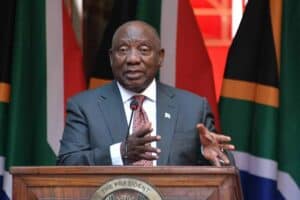Al Jama-ah leader Ganief Hendricks said: 'Afrikaner firms, in particular, must apologise' for the damage caused by apartheid policies.

The Al Jama-ah party has demanded that in the light of former president FW de Klerk’s unconditional apology for apartheid sins, white businesses and law firms that operated under apartheid must do likewise and pay reparations to apartheid victims.
Al Jama-ah leader and member of parliament Ganief Hendricks said: “Afrikaner firms, in particular, must apologise” for the damage caused by apartheid policies to black and brown people.”
They must also pay compensation to the victims at a higher rate than Germany paid to its Western Allies for war crimes, he said.
In addition, the businesses must also pay and clear the South African foreign debt.
“Al Jama-ah was one of the first political parties to have accepted the acknowledgement and unconditional apology of former president De Klerk for the harm caused to the previously oppressed masses. Heads of businesses, the commerce, big law firms, other industries and especially Afrikaners must do the same and pay reparations at a higher rate than what Germany had to pay to its Western allies,” Hendricks said.
This is a minimum requirement, which must be funded by the wealth accumulated over generations due to the crimes committed against the oppressed masses. He also asked for the residents of the Cape Flats who are still the “Cinderellas” of apartheid to be compensated.
ALSO READ: WATCH: FW de Klerk speaks from the dead, apologises for apartheid’s pain
In the message, De Klerk had said: “On many occasions I apologised for the pain and the indignity that apartheid brought to persons of colour in South Africa.
“Many believed me, but others didn’t.
“So let me, therefore, today, in this last message repeat, I, without qualification, apologise for the pain and the hurt and the indignity and the damage that apartheid has done” to blacks, coloureds and Indians in South Africa.
Former president Thabo Mbeki said history would remember De Klerk “for accepting the reality” of the opposition to apartheid. “The decision he and his cabinet colleagues took and announced on 2 February 1990, to release political prisoners and unban political organisations, paved the way for the formal negotiations which led us to the democratic transition,” Mbeki said.
Hendricks said although De Klerk was courageous, Al Jama-ah remained concerned that members of the Pan Africanist Congress of Azania (PAC) remained in prison at the time. He referred to PAC president Mzwanele Nyhontso’s statement that his party would never forgive De Klerk and that the party would not observe a moment of silence in his honour in parliament.
NOW READ: FW de Klerk’s funeral will be a private ceremony for family only
Support Local Journalism
Add The Citizen as a Preferred Source on Google and follow us on Google News to see more of our trusted reporting in Google News and Top Stories.








